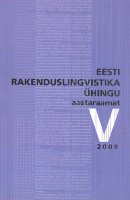“Letosvet”: kas labane laul või (rahva)sotsiolingvistiline eksperiment?
“Letosvet”: A vulgar song or a folk-(socio)linguistic experiment?
Author(s): Anna Verschik, Jim HlavacSubject(s): Language and Literature Studies
Published by: Eesti Rakenduslingvistika Ühing (ERÜ)
Keywords: multilingualism; Eurovision; folk linguistics; Estonian; Serbian
Summary/Abstract: The article explores the song Letosvet that represented Estonia in 2008 Eurovision Song Contest in Belgrad. The song is remarkable in several respects: 1) it is an imitation of Serbian, a language that Estonians have practically no contact and, therefore, ready-made imitation devices do not exist; 2) the song has generated controversial opinions that provide an excellent material for a research in folk linguistics; 3) the song raises the question, what kind of imitation is intelligible to the native speakers. The authors have skillfully drawn on the resources of Russian, a closely related Slavic language. The analysis demonstrates that despite negative attitudes expressed in Estonian media and claims that the language of the song is erroneous and unintelligible to the Serbs, the non-target forms are in fact not numerous. It is rather incoherence and divergence from the genre of Eurovision songs that might hinder comprehension. The authors of the song have tried to perform an alternative type of multilingualism that, contrary to the mainstream expectation, does not include English.
Journal: Eesti Rakenduslingvistika Ühingu aastaraamat
- Issue Year: 2009
- Issue No: 5
- Page Range: 313-327
- Page Count: 15
- Language: Estonian

